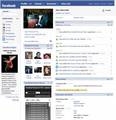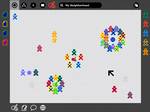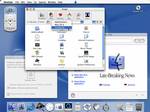- go to the top
- About WN
- Contact
- Feedback
- Privacy Policy
- © 2011 World News Inc., all Rights Reserved
-
Marc Andreessen

Marc Andreessen (born July 10, 1971) is an investor, startup coach, blogger, and a multi-millionaire software engineer best known as co-author of Mosaic, the first widely-used web browser, and co-founder of Netscape Communications Corporation. He was the chair of Opsware, a software company he founded originally as Loudcloud, when it was acquired by Hewlett-Packard. He is also a co-founder of Ning, a company which provides a platform for social-networking websites. On June 30, 2008, Facebook announced that he had joined their Board of Directors. On September 30, 2008, it was announced that he had joined the Board of Directors of eBay, and on September 17, 2009, it was announced he had been named to the board of HP. Andreessen is a frequent keynote speaker and guest at Silicon Valley conferences.
http://wn.com/Marc_Andreessen -
Tim Berners-Lee

Sir Timothy John "Tim" Berners-Lee, OM, KBE, FRS, FREng, FRSA (born 8 June 1955, also known as "TimBL"), is a British engineer and computer scientist and MIT professor credited with inventing the World Wide Web, making the first proposal for it in March 1989. On 25 December 1990, with the help of Robert Cailliau and a young student at CERN, he implemented the first successful communication between an HTTP client and server via the Internet.
http://wn.com/Tim_Berners-Lee
-
Microsoft

Microsoft Corporation is a public multinational corporation headquartered in Redmond, Washington, USA that develops, manufactures, licenses, and supports a wide range of products and services predominantly related to computing through its various product divisions. Established on April 4, 1975 to develop and sell BASIC interpreters for the Altair 8800, Microsoft rose to dominate the home computer operating system (OS) market with MS-DOS in the mid-1980s, followed by the Microsoft Windows line of OSs. The ensuing rise of stock in the company's 1986 initial public offering (IPO) made an estimated four billionaires and 12,000 millionaires from Microsoft employees. Microsoft would come to dominate other markets as well, notably the office suite market with Microsoft Office.
http://wn.com/Microsoft -
Mozilla Foundation
The Mozilla Foundation (abbreviated MoFo) is a non-profit organization that exists to support and provide leadership for the open source Mozilla project. The organization sets the policies that govern development, operates key infrastructure and controls trademarks and other intellectual property. It owns two taxable for-profit subsidiaries: the Mozilla Corporation, which employs several Mozilla developers and coordinates releases of the Mozilla Firefox web browser, and Mozilla Messaging, Inc., which primarily develops the Mozilla Thunderbird email client. The Mozilla Foundation is based in the Silicon Valley city of Mountain View, California, USA.
http://wn.com/Mozilla_Foundation
- Adobe Flash
- Apple inc.
- application software
- beta (software)
- Browser extension
- browser war
- Browser wars
- computer program
- de facto
- embedded system
- file systems
- file URL scheme
- Firefox
- Geobrowsing
- Google Chrome
- home page
- HTML
- HTTP cookie
- HTTP Secure
- HTTPS
- Hyperlinks
- incremental find
- Internet
- Internet bookmark
- Internet Explorer
- Internet Relay Chat
- Internet suite
- Internet suites
- Java applets
- layout engine
- List of web browsers
- Marc Andreessen
- markup language
- Microsoft
- Microsoft Windows
- Mobile browser
- mobile phone
- Mozilla Foundation
- NCSA Mosaic
- Net Applications
- Netscape
- Netscape Navigator
- News aggregator
- NeXT
- Nintendo
- open source
- Opera (web browser)
- Opera Software
- page zooming
- Plug-in (computing)
- pop-up blockers
- private networks
- Safari (web browser)
- SeaMonkey
- search engine
- software application
- status bar
- Tim Berners-Lee
- Usenet
- web feed
- web page
- web servers
- Wii
- World Wide Web
- WorldWideWeb
- XHTML
- XML




- Order: Reorder
- Duration: 9:47
- Published: 23 Oct 2008
- Uploaded: 26 Dec 2011
- Author: ScratchedChalkVideos


- Order: Reorder
- Duration: 11:26
- Published: 23 May 2010
- Uploaded: 01 Jan 2012
- Author: pocketnowvideo

- Order: Reorder
- Duration: 3:57
- Published: 04 Sep 2008
- Uploaded: 24 Dec 2011
- Author: digitaljournal


- Order: Reorder
- Duration: 10:38
- Published: 17 Dec 2011
- Uploaded: 07 Jan 2012
- Author: skyghene22

- Order: Reorder
- Duration: 9:44
- Published: 03 Apr 2006
- Uploaded: 01 Jan 2012
- Author: peestandingup

- Order: Reorder
- Duration: 9:20
- Published: 24 May 2010
- Uploaded: 02 Jan 2012
- Author: pocketnowvideo


- Order: Reorder
- Duration: 6:56
- Published: 03 May 2011
- Uploaded: 25 Dec 2011
- Author: CrackBerrydotCom

- Order: Reorder
- Duration: 7:39
- Published: 17 May 2009
- Uploaded: 06 Jan 2012
- Author: MacOSXTutorials12


- Order: Reorder
- Duration: 3:16
- Published: 16 Nov 2010
- Uploaded: 06 Jan 2012
- Author: BlackBerry

- Order: Reorder
- Duration: 9:07
- Published: 19 Apr 2009
- Uploaded: 04 Jan 2012
- Author: environmentalnerd53



- Order: Reorder
- Duration: 1:09
- Published: 21 Dec 2011
- Uploaded: 06 Jan 2012
- Author: sonyericsson



- Order: Reorder
- Duration: 5:40
- Published: 15 Apr 2010
- Uploaded: 06 Jan 2012
- Author: pocketnowvideo
size: 13.7Kb
size: 3.6Kb
- address bar
- Adobe Flash
- Apple inc.
- application software
- beta (software)
- Browser extension
- browser war
- Browser wars
- computer program
- de facto
- embedded system
- file systems
- file URL scheme
- Firefox
- Geobrowsing
- Google Chrome
- home page
- HTML
- HTTP cookie
- HTTP Secure
- HTTPS
- Hyperlinks
- incremental find
- Internet
- Internet bookmark
- Internet Explorer
- Internet Relay Chat
- Internet suite
- Internet suites
- Java applets
- layout engine
- List of web browsers
- Marc Andreessen
- markup language
- Microsoft
- Microsoft Windows
- Mobile browser
- mobile phone
- Mozilla Foundation
- NCSA Mosaic
- Net Applications
- Netscape
- Netscape Navigator
- News aggregator
- NeXT
- Nintendo
- open source
- Opera (web browser)
- Opera Software
- page zooming
- Plug-in (computing)
- pop-up blockers
- private networks
- Safari (web browser)
- SeaMonkey
- search engine
- software application
- status bar
size: 5.9Kb
size: 0.5Kb
size: 9.5Kb
size: 6.8Kb
size: 7.5Kb
size: 1.4Kb
size: 0.7Kb
A web browser is a software application for retrieving, presenting, and traversing information resources on the World Wide Web. An information resource is identified by a Uniform Resource Identifier (URI) and may be a web page, image, video, or other piece of content. Hyperlinks present in resources enable users easily to navigate their browsers to related resources. A web browser can also be defined as an application software or program designed to enable users to access, retrieve and view documents and other resources on the Internet.
Although browsers are primarily intended to access the World Wide Web, they can also be used to access information provided by web servers in private networks or files in file systems.
The major web browsers are Internet Explorer, Firefox, Google Chrome, Safari, Opera and SeaMonkey.
History
thumb|250px|right|WorldWideWeb for NeXT, released in 1991, was the first web browser.The history of the web browser dates back to the late 1980s, when a variety of technologies laid the foundation for the first web browser, WorldWideWeb, by Tim Berners-Lee in 1991. That browser brought together a variety of existing and new software and hardware technologies.
The introduction of the NCSA Mosaic web browser in 1993 – one of the first graphical web browsers – led to an explosion in web use. Marc Andreessen, the leader of the Mosaic team at NCSA, soon started his own company, named Netscape, and released the Mosaic-influenced Netscape Navigator in 1994, which quickly became the world's most popular browser, accounting for 90% of all web use at its peak (see usage share of web browsers).
Microsoft responded with its Internet Explorer in 1995 (also heavily influenced by Mosaic), initiating the industry's first browser war. Bundled with Windows, Internet Explorer gained dominance in the web browser market; Internet Explorer usage share peaked at over 95% by 2002.
Opera debuted in 1996; although it has never achieved widespread use, having less than 1% browser usage share as of February 2009 according to Net Applications,, having grown to 2.14 in April 2011 its Opera-mini version has an additive share, in April 2011 amounting to 1.11 % of overall browser use, but focused on the fast-growing mobile phone web browser market, being preinstalled on over 40 million phones. It is also available on several other embedded systems, including Nintendo's Wii video game console.
In 1998, Netscape launched what was to become the Mozilla Foundation in an attempt to produce a competitive browser using the open source software model. That browser would eventually evolve into Firefox, which developed a respectable following while still in the beta stage of development; shortly after the release of Firefox 1.0 in late 2004, Firefox (all versions) accounted for 7.4% of browser use. As of August 2011, Firefox has a 27.7% usage share.
Apple's Safari had its first beta release in January 2003; as of April 2011, it has a dominant share of Apple-based web browsing, accounting for just over 7.15% of the entire browser market.
The most recent major entrant to the browser market is Google's Chrome, first released in September 2008. As of August 2011, it has a 22.99 usage share.
Function
The primary purpose of a web browser is to bring information resources to the user. This process begins when the user inputs a Uniform Resource Locator (URL), for exampleIn the case of http, https, file, and others, once the resource has been retrieved the web browser will display it. HTML is passed to the browser's layout engine to be transformed from markup to an interactive document. Aside from HTML, web browsers can generally display any kind of content that can be part of a web page. Most browsers can display images, audio, video, and XML files, and often have plug-ins to support Flash applications and Java applets. Upon encountering a file of an unsupported type or a file that is set up to be downloaded rather than displayed, the browser prompts the user to save the file to disk.
Information resources may contain hyperlinks to other information resources. Each link contains the URI of a resource to go to. When a link is clicked, the browser navigates to the resource indicated by the link's target URI, and the process of bringing content to the user begins again.
Features
Available web browsers range in features from minimal, text-based user interfaces with bare-bones support for HTML to rich user interfaces supporting a wide variety of file formats and protocols. Browsers which include additional components to support e-mail, Usenet news, and Internet Relay Chat (IRC), are sometimes referred to as "Internet suites" rather than merely "web browsers".
All major web browsers allow the user to open multiple information resources at the same time, either in different browser windows or in different tabs of the same window. Major browsers also include pop-up blockers to prevent unwanted windows from "popping up" without the user's consent.
Most web browsers can display a list of web pages that the user has bookmarked so that the user can quickly return to them. Bookmarks are also called "Favorites" in Internet Explorer. In addition, all major web browsers have some form of built-in web feed aggregator. In Firefox, web feeds are formatted as "live bookmarks" and behave like a folder of bookmarks corresponding to recent entries in the feed. In Opera, a more traditional feed reader is included which stores and displays the contents of the feed.
Furthermore, most browsers can be extended via plug-ins, downloadable components that provide additional features.
User interface
Most major web browsers have these user interface elements in common:Major browsers also possess incremental find features to search within a web page.
Privacy and security
Most browsers support HTTP Secure and offer quick and easy ways to delete the web cache, cookies, and browsing history. For a comparison of the current security vulnerabilities of browsers, see comparison of web browsers.
Standards support
Early web browsers supported only a very simple version of HTML. The rapid development of proprietary web browsers led to the development of non-standard dialects of HTML, leading to problems with interoperability. Modern web browsers support a combination of standards-based and de facto HTML and XHTML, which should be rendered in the same way by all browsers.
Extensibility
A browser extension is a computer program that extends the functionality of a web browser. Every major web browser supports the development of browser extensions.
See also
References
External links
af:Webblaaier ar:متصفح ويب ast:Restolador web az:Brauzer bn:ওয়েব ব্রাউজার zh-min-nan:Bāng-ia̍h liû-lám-khì be:Web-браўзер be-x-old:Браўзэр bar:Browser bs:Internetski preglednik br:Merdeer bg:Уеб браузър ca:Navegador web cs:Webový prohlížeč da:Webbrowser de:Webbrowser dsb:Seśowy wobglědowak et:Brauser el:Web browser es:Navegador web eo:TTT-legilo ext:Escrucaol web eu:Web nabigatzaile fa:مرورگر وب fr:Navigateur Web ga:Brabhsálaí gréasáin gd:Brabhsair-lìn gl:Navegador web ko:웹 브라우저 hy:Ցանցային դիտարկիչ hi:वेब ब्राउज़र hsb:Syćowy wobhladowak hr:Internetski preglednik ilo:Web browser id:Peramban web ia:Navigator web is:Vafri it:Browser he:דפדפן ka:ინტერნეტ ბრაუზერი csb:Internetowi przezérnik kk:Веб шолғыш kw:Peurel wias ku:Gerok lo:ເວັບເບຣົາວ໌ເຊີຣ໌ la:Navigatrum lv:Tīmekļa pārlūkprogramma lb:Webbrowser lt:Naršyklė li:Webbrowser ln:Litámbwisi-bolúki lmo:Web browser hu:Webböngésző mk:Веб прелистувач ml:വെബ് ബ്രൗസർ mr:आंतरजाल न्याहाळक ms:Pelayar web mn:Вэб хөтөч nl:Webbrowser ne:वेब ब्राउजर ja:ウェブブラウザ no:Nettleser nn:Nettlesar oc:Navegador web mhr:Браузер uz:Brauzer nds:Nettkieker pl:Przeglądarka internetowa pt:Navegador ro:Browser ru:Браузер sah:Уэб браузер se:Fierpmádatlogan sq:Shfletues Interneti simple:Web browser sk:Webový prehliadač sl:Spletni brskalnik ckb:وێبگەڕ sr:Браузер sh:Web pretraživač fi:Verkkoselain sv:Webbläsare tl:Web browser ta:உலாவி tt:Гизгеч th:เว็บเบราว์เซอร์ tr:Web tarayıcısı uk:Браузер ur:متصفح حبالہ vi:Trình duyệt web wa:Betchteu waibe yi:בלעטערער yo:Web browser zh-yue:網頁瀏覽器 zh:网页浏览器
This text is licensed under the Creative Commons CC-BY-SA License. This text was originally published on Wikipedia and was developed by the Wikipedia community.

































